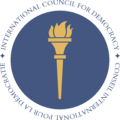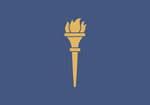International Council for Democracy: Difference between revisions
ProAtLosing (talk | contribs) |
m (→Member states) |
||
| Line 198: | Line 198: | ||
|{{flag|Satavia}} | |{{flag|Satavia}} | ||
|[[Jago Elliot]] | |[[Jago Elliot]] | ||
|1938 | |1938 (1976) | ||
|Suspended 1944<br>Readmitted 1976 | |Suspended 1944<br>Readmitted 1976 | ||
|- | |- | ||
Revision as of 13:12, 14 May 2022
This article is incomplete because it is pending further input from participants, or it is a work-in-progress by one author. Please comment on this article's talk page to share your input, comments and questions. Note: To contribute to this article, you may need to seek help from the author(s) of this page. |
 Logo of the ICD | |
 Flag of the ICD | |
| Formation | November 1, 1938 |
|---|---|
| Type | Intergovernmental organization |
| Purpose | Promotion of democracy |
| Location | |
Official languages | Gaullican, Estmerish |
| Subsidiaries | GIFA GDB |
| Website | icd |
The International Council for Democracy (ICD) is an international organization intended to uphold and promote democracy and the rule of law in its member states and around the world. Founded in 1938, it is often considered a continuation of the Grand Alliance from the Great War. Two subsidiary institutions, the Global Institute for Fiscal Affairs and Global Development Bank, operate as organs of the ICD. The ICD is an official Community of Nations observer and the two organizations have a history of cooperation. The organization is headquartered in Morwall, Estmere.
Activities
The ICD aims to uphold and promote democracy on the international stage. As such, many of its activities seek to bolster existing democracies and assist in the process of democratization in emerging democracies. One of its best-known activities is the organization’s annual Report on Global Democracy, which assesses the state of democracy in its member states and partners. States are evaluated and compared in the report’s National Democracy Index.
The organization also monitors elections in member states and partners through its Office for Elections and Democratic Institutions (OEDI). Election monitors are deployed on a short-term or long-term basis spanning each phase of the electoral process.
The ICD has ongoing partnerships with non-governmental organizations (NGOs) that promote democracy and human rights in both developed and developing countries. The ICD regularly issues joint reports with NGOs on topics including the rights of LGBT people, women, children, and racial and ethnic minorities, prison conditions, the use of torture and the death penalty, and freedom of the press. These reports are circulated among other international organizations and member states and intended to inform debate regarding the protection of human and civil rights in national and international law.
Structure
Institutions:
- Secretariat
- Secretary-General
- Office for Elections and Democratic Institutions
- Office for Human Rights
- Office for the Rule of Law and Anti-Corruption
- Permanent Council
- Assembly of Ministers (Foreign ministers' meeting group)
Associated institutions:
Current leadership
Relationship with other intergovernmental organizations
The ICD is a permanent observer at the Community of Nations International Assembly.
Funding
The ICD is funded by dues assessed on member states and partners as well as donations from the private sector, mainly foundations and non-government organizations that have a focus on civil society and development. The ICD does not distribute funds directly to its subsidiary organs, GIFA and the GDB, as they have separate funding mechanisms.
National Democracy Index
Membership
Member states
| State | Head of State | Year Joined | Notes |
|---|---|---|---|
| Augstine Valeria | |||
| Anthony Benoudjita | 1991 (2014) | Suspended 2000 Readmitted 2014 | |
| Caetano Villa-Lobos | 1938 | ||
| Jean Tremblay | 1938 | ||
| File:Eldmark.png Eldmark | Thyri I | 1938 | |
| Template:Country data Estmere | Alice Roberts | 1938 | |
| Jean Valette | 1938 | ||
| Kenneth IV | 1952 | ||
| Benjamin Claude | 1952 | ||
| File:ImaguaFlag.png Imagua and the Assimas | Edmondo Privitera | 1948 | Partner from 1938 to its independence 1948 |
| William II | 1938 | ||
| Colegio | 1938 | ||
| 1938 | |||
| Erasmo | 1947 | ||
| Michel Thiele | 1945 | Member as the United Provinces from 1945-1954 | |
| Jago Elliot | 1938 (1976) | Suspended 1944 Readmitted 1976 | |
| Théodore I | 1953 | ||
| Atwan al-Tughluq | |||
| Charlotte I | 1938 |
Partners
| State | Head of State | Year Partnered | Notes |
|---|---|---|---|
| Arnaud Noirenègre | 1984 |
Former members
- Etruria - withdrew in 2018
- Rwizikuru - suspended in 1959, expelled in 1964
- Tengaria- suspended in 1958, withdrew in 1959